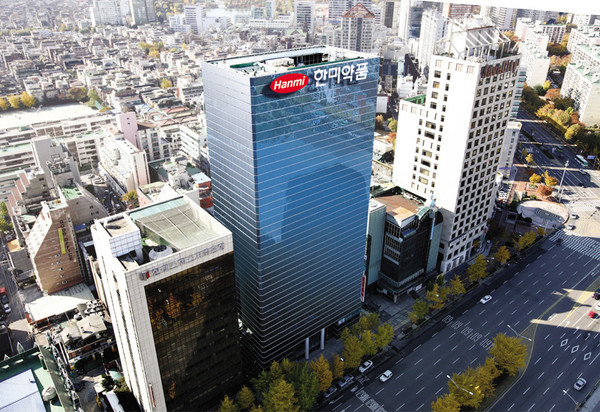Hanmi shares plunge by over 15 percent on Wednesday morning
The U.S. Food and Drug Administration (FDA) on Tuesday raised concerns over the safety and efficacy of poziotinib, a non-small cell lung cancer (NSCLC) licensed out by Hanmi Pharmaceutical to Spectrum Pharmaceuticals.

Poziotinib aims to treat NSCLC with locally advanced and metastatic HER2 Exon 20 insertion mutation, for which there is currently no suitable treatment.
Hanmi licensed out the candidate to Spectrum in 2019, and the latter submitted a new drug application (NDA) for poziotinib to the FDA in December of last year.
Hanmi and Spectrum had high hopes that the candidate would receive FDA approval this year.
However, in a briefing document published ahead of its Oncologic Drugs Advisory Committee (ODAC) Meeting on Thursday, the FDA released a negative opinion on poziotinib.
According to the document, the FDA stressed that if granted accelerated approval, poziotinib would be the "least effective" targeted therapy for lung cancer approved to date.
The FDA staff expressed concern that poziotinib's objective response rate (ORR) was low at 28 percent.
The advisory committee directly compared poziotinib’s ORR with the ORR of AstraZeneca-Daichi Sankyo's antibody-drug conjugate (ADC) anticancer drug Enhertu (ingredient: trastuzumab deruxtecan), which was 58 percent.
The FDA also pointed out that the median response duration (mDoR) of poziotinib was 5.1 months, which was lower than Enhertu's 8.7 months.
The agency considered that there is also a high side effect risk in terms of the safety of poziotinib.
"Among the 368 patients that received 16 mg of poziotinib once-a-day, 57 percent of patients experienced dose reductions, and 85 percent of patients experienced grade 3-4 adverse events," the document read.
While the FDA noted that the rate of interruptions and dose reductions might be mitigated in patients receiving alternative dosages, Spectrum would have to conduct additional analysis on the efficacy of the alternative dosages.
With the FDA's negative opinion, industry watchers are speculating that it will be difficult for Hanmi and Spectrum to receive approval for poziotinib this year. The FDA needs to decide on whether to approve the drug by Nov. 24.
Regarding the FDA's document, Hanmi explained that poziotinib is not a first-line treatment but a second- and third-line treatment and that side effects are highly likely due to the nature of anticancer drugs, which makes it necessary to consider the benefits versus the risks.
"Adverse reactions reported so far are also cases that occur with other drugs," a Hanmi official said. "As adverse cases are fully predictable and manageable, we believe that the benefits of poziotinib to patients clearly outweigh the risks."
In terms of efficacy, lung cancer has a very high fatality rate compared to other cancer types, so various treatment options should be provided to patients, he added.
The Hanmi official stressed that the usefulness of poziotinib is clear in that it can be administered as a second or third treatment to patients who do not respond to existing treatments and provides convenience in administration as an oral formulation rather than an intravenous (IV) method.
"It is important to note that ODAC's advice does not determine the FDA's approval," the Hanmi official said. "The FDA will make a final approval by Nov. 24 after reviewing all circumstances, including the ODAC recommendation."
Despite Hanmi's explanation, the stock market reacted negatively to the news.
As of 11:00 a.m. Wednesday, Hanmi's shares stood at 237,000 won ($170), down 15.36 percent from the previous trading day. Shares of Spectrum Pharmaceutical also tanked by more than 30 percent and ended Tuesday's trading day at $0.66.
Related articles
- Hanmi to start confirmatory NSCLC trial of poziotinib in Korea
- [Weekly stock relay] Analysts maintain 'buy' opinion for Hanmi based on high growth expectations
- Hanmi makes US partner an affiliate to step up advances in global markets
- FDA panel votes against Spectrum’s lung cancer drug candidate licensed out by Hanmi
- FDA hands Hanmi’s US partner, Spectrum, a poziotinib CRL to request supplementary data

